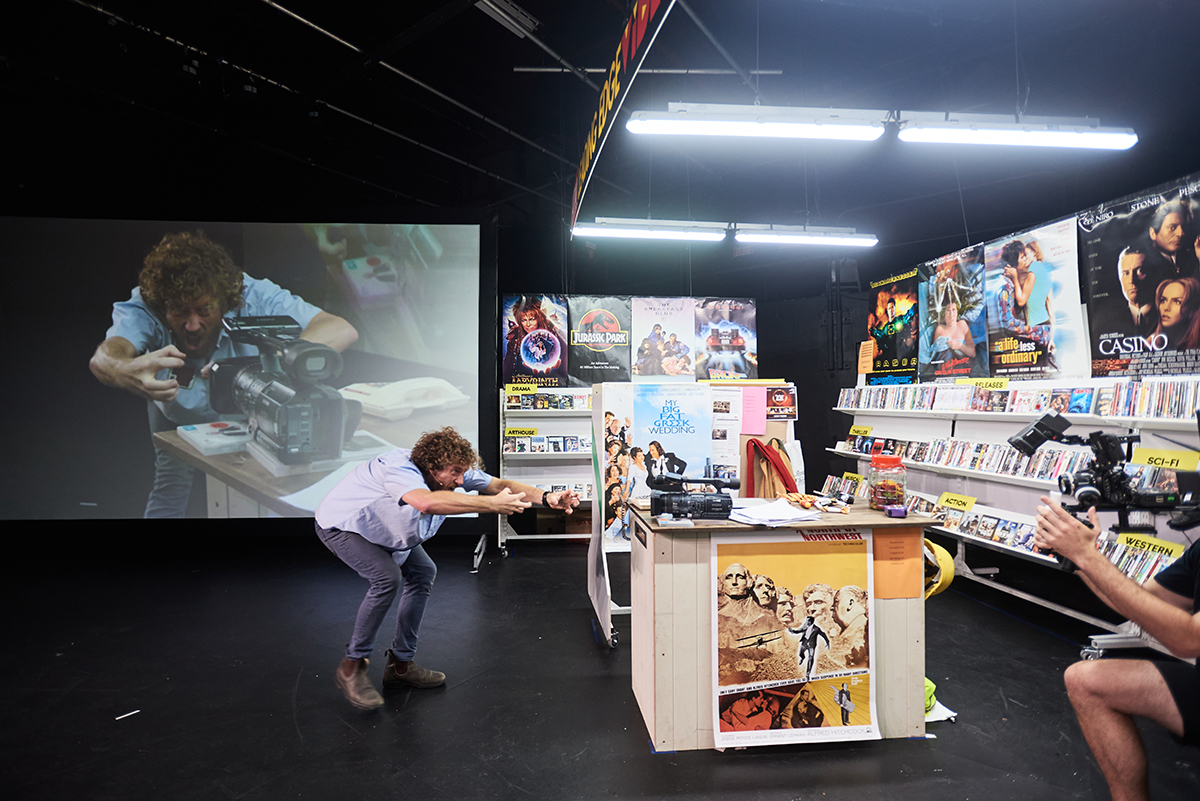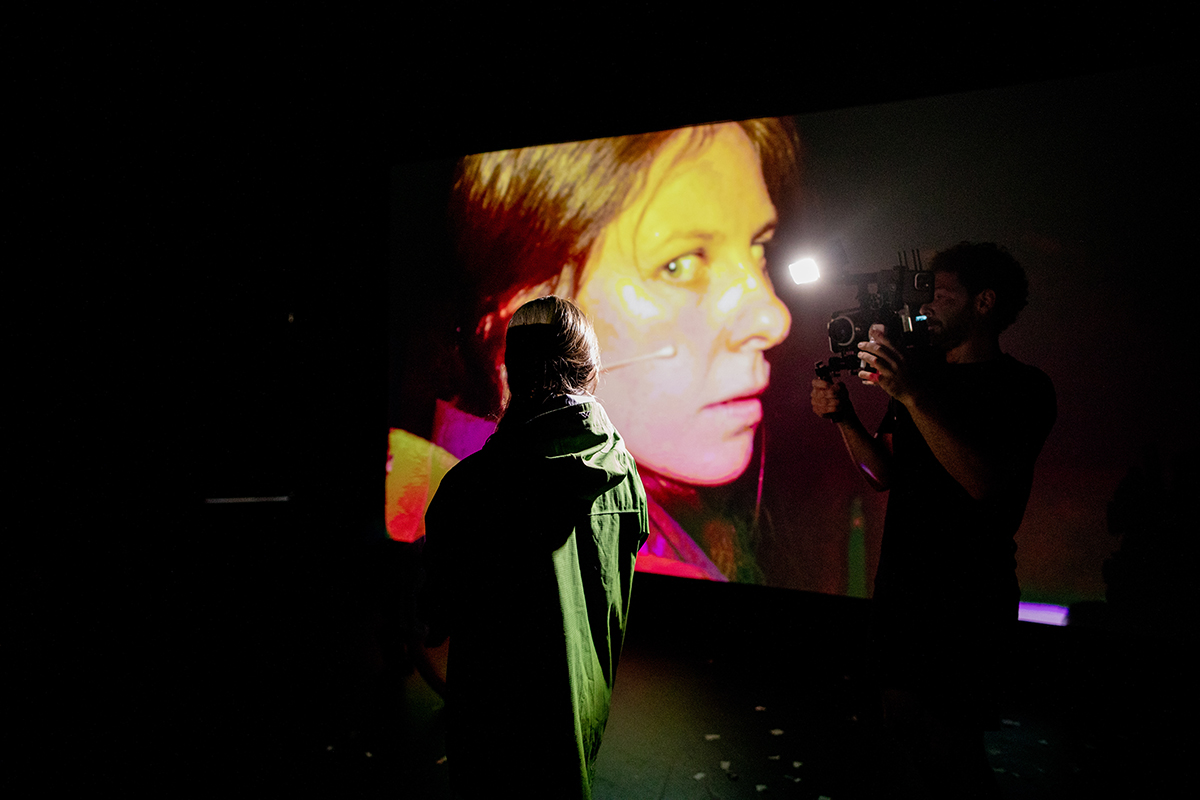
re:group, COIL: Looping loss & laughter
re:group’s live-cinema event COIL is an astonishingly multi-layered, funny-sad eulogy for, among other things, the demise of video rental stores around Australia, including the wonderful Film Club in Sydney’s Darlinghurst, which closed March 14. The audience for COIL at Sydney’s PACT in February groaned at mention of the imminent loss.
A “multi-layered eulogy” because the store closures are the foundation in COIL on which other grievings are built: for the diminution of a Wollongong University graduate performance collective from 15 to three members over a decade and some seven productions; for the loss of a pivotal creative bro-mance; for not making a promised film which is reduced to an hilariously inadequate trailer, miraculously manufactured before our eyes by a mere trio of maker-performers; and for the failure of another personal relationship, which that trailer symbolises.
Yes, it’s complex, even metaphysical, as suggested by the title COIL which is embodied in the work’s marvellous play with looping time and recollection. And it’s critical — of commercial streaming’s narrowing of creativity and access. The more content, the more choice promised by streaming services comes at a growing subscription expense and cultural cost with rarer, often even major films ever disappearing from our reach.
Film Club had an enormous inventory of arthouse films from many nations alongside commercial fare, cult films, classic silent movies and, not least, says COIL, “weird movies.” There’s small respite for cinephiles with access to MUBI, but little sign of the Criterion Channel becoming available in Australia. Anyway, these can’t replace the sheer range of choice and the sense of community often engendered by video stores — commercial businesses serving the common good.
This irony is underlined when COIL’s host, Steve Wilson-Alexander, recalls a woman who on seeing the closed video store (where Wilson-Alexander worked) in scaffolding, angrily demands,” Why weren’t we told about this? It’s a public building!” (It wasn’t) He imagines his passionate retort, “I thought…When was the last time you went here? To your local bookshop, record shop, the theatre, a gig? You did this, lady! … We’ll sacrifice anything for the sake of ease. I do it without thinking, with a click.”
The major player in COIL, Wilson-Alexander rapidly alternates between frankly confessional host, video store employee, the Thirroul store’s owners (for 38 years), customers, a cocky tradie measuring the space as a prelude to knocking down walls and a child wanting a lolly snake: “What film do you like best?” asks Wilson-Alexander. “YouTube,” replies the kid. Then there are the sci-fi/horror grotesques Wilson-Alexander realises for the trailer.
The performer dextrously role-switches with remarkable speed, while Solomon Thomas, in black, hovers close about him with camera, issuing instructions, shooting with unruffled ease live-to-screen images and recording numerous snippets of action that will add up to the trailer of the promised film. The latter takes, startlingly brief and without introduction, often make no immediate sense but are hilariously instructive about filmmaking craft, its cliches and, for the knowing, references to an array of films. Carly Young, working at a bank of computers to the side, steps onstage to facilitate the shooting of brief episodes (including catching a stream of tossed DVD cases) before playing herself, the writer of the COIL screenplay that Wilson-Alexander promised to film.
All of this is realised in a highly effective facsimile of a video shop, replete with the actual store sign rescued from Video Edge where Wilson-Alexander had once worked. A large screen extending the set to the left allows audience and performers to simultaneously view live and screen action in close juxtaposition. The handling of the DVDs, the stacking, displaying, the favourites held up to camera (along with litanies of personal preferences and dislikes) and one DVD sleeve with a spooky life of its own, evoke a deep sense of familiarity with the tedium and weirdness of video store life, executed with great humour — slapstick, sight gags, screen jokes and wit.
Fun aside, COIL is a serious reflection on loss. Through a weave of anecdotes, store scenes and trailer takes, writer Mark Rogers ingeniously threads Wilson-Alexander’s recollections of his personal and creative friendship with former company member and, implicitly, re:group artistic director Jackson Davis, who left to train as a nurse in Hobart and is now rarely in contact, let alone seen. Wilson-Alexander repeatedly loops back to the relationship, how the pair made their first films in high school, cycled to video shops from Wollongong to Thirroul, and playfully argued over which film directors were best. Wilson-Alexander’s recurring lament is a closed loop, analogously the coil of Young’s time travel screenplay. Wilson-Alexander asks her, “Is the main character the guy who goes back in time or the future version of him? … What does that even mean? … I think your time travel mechanics might need some work.” So might his.
Prior to the screening of the trailer, there’s a surprising shift in tone: a poignant, finely played reckoning of the relationship other than with Davis, between Carly Young and Wilson-Alexander — another in which Wilson-Alexander’s fixation on the past undoes him. It’s a melancholy but a perfect reveal of an underlying sadness. The trailer is as hilarious as we expected it to be, but for Young, sombrely declaring: “It made me kind of sad. Watching it’s like being back there. But we’re not.”
Of course, I’m curious. Are these ‘characters’ the real Carly Young and Steve Wilson-Alexander, or Wilson-Alexander’s projections, or performer personae, the versions of themselves they’re happy to offer writer-confidante Mark Rogers and us for their art, for some greater good? We’re not to know, but being granted insights, largely comedically played, into these artists’ lives — creative and personal and their intertwining — is one of COIL’s key pleasures. This is especially so when the sense of personal loss is coiled within an overarching eulogy for video stores — not the performance spaces and opera houses we associate with culture, but just as subject to the predations of commerce and a diminishing sense of the common good.
COIL is the product of a remarkable collective effort, evident in the tightly synchronised interplay of live and screened action, in Solomon Thomas and Steve Wilson-Alexander’s camera-performer duet danced across every inch and angle of the video store, in Wilson-Alexander and Carly Young’s quiet moment of truth-telling, and in the extreme character gearshifts, physical and vocal, demanded of Wilson-Alexander by this group-realised creation, including Mark Rogers’ deft live cinema screenplay, in which the present is always coiling back into past.
COIL will enjoy another Sydney season, 8-11 June, at the Sydney Opera House as part of the house’s innovative UnWrapped program.
re:group before
Among COIL’s wonderful precursors was Lovely, one of my favourite performance experiences of the last decade, a seamlessly choreographed interplay of live camera work and performance in a loving attempt to call back Philip Seymour Hoffman from the dead, which I reviewed in “Loving Philip Seymour Hoffman” (RT125, Feb-March 2015). Nikki Heywood’s response in “Homemade space travel” (25 October 2017, RealTime online), to Route Dash Niner: Part II captures re:group’s genius at making a spectacular and meaningful low-budget live sci-fi movie.
In an interview with RealTime in 2017, “Jackson Davis: The art of videographic performance” (RealTime online 21 November 2017), Davis gave a fascinating account of the collective’s workings and inspirations. Since its inception in 1994, RealTime documented the growth of the interplay of live camera feed and performance, not least in dance, by dedicated innovators working on the cultural margins. Mainstream theatre has finally caught up, often on a grand scale, sometimes at the expense of the live body made ridiculously small against its screen self. Not so re:group’s finely honed, intimate balance of performer and image.
—
re:group performance collective, COIL, Steve Wilson-Alexander, Solomon Thomas, Carly Young, video design Solomon Thomas, screenplay Mark Rogers, automation programming Chris Howell, sound design Liam ‘Snowy’ Halliwell, creative producer Malcolm Whittaker, set realisation Alistair Davies; PACT Theatre, Sydney, 10-12 Feb;
Top image credit: Lucy Parakhina







